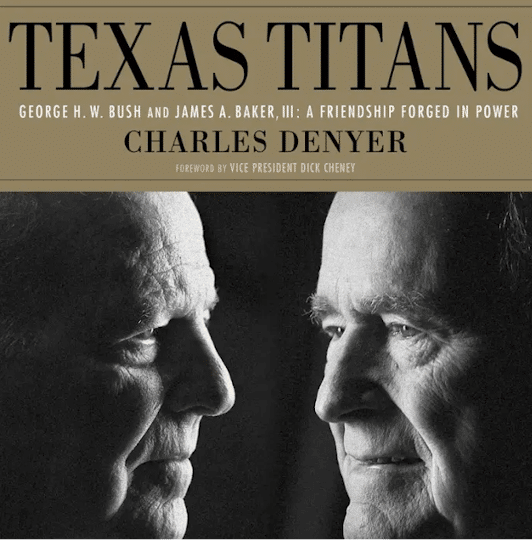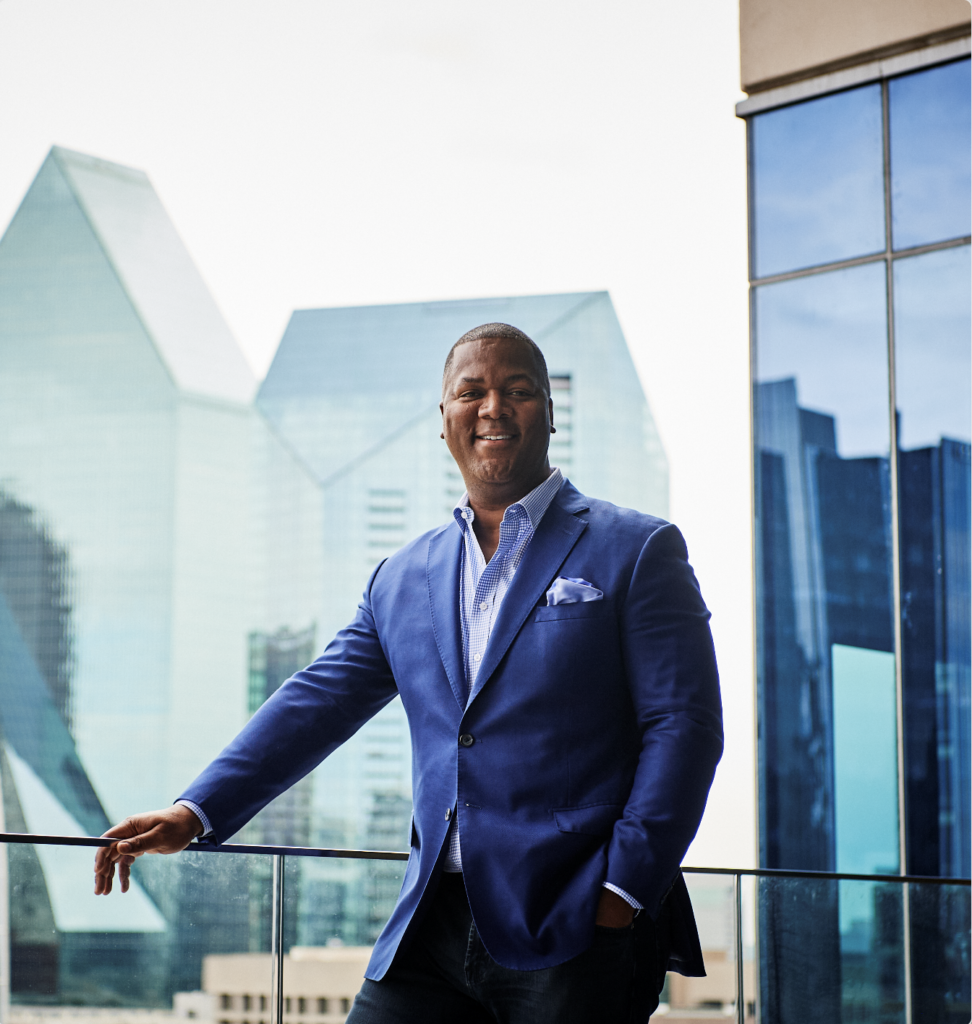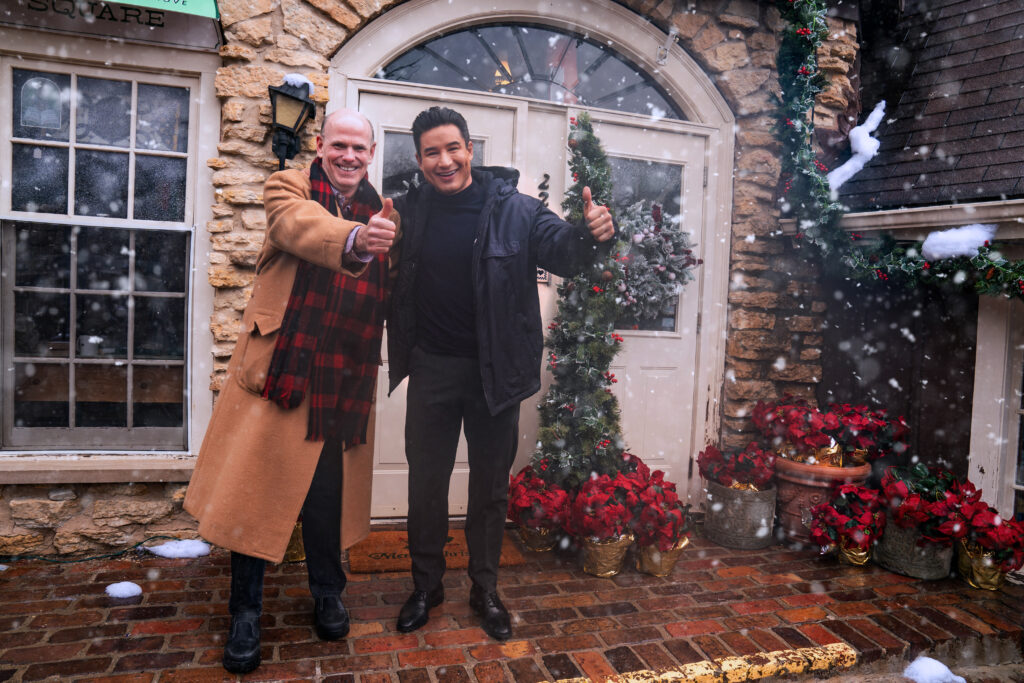Bush & Baker: The Story of Two “Texas Titans”

A conversation with Charles Denyer
In Texas Titans, Charles Denyer tells the story of the longstanding friendship and political partnership of George Herbert Walker Bush and James Addison Baker III. It was an alliance that began on a Houston tennis court in the 1960s and ended with Bush’s passing in 2018, with Baker at his side. In the intervening decades, these two statesmen drew on each other’s strengths to rise to the heights of power and lead through some of the most turbulent years the United States—and the world—has ever seen. Bush would take the Oval Office, of course, while Baker would become a tireless campaigner and serve as Secretary of State, Secretary of the Treasury, and Bush’s chief of staff.
Denyer’s new book examines the full scope of Bush and Baker’s relationship, from their world-shifting achievements to the more intimate and personal side of their friendship. In this conversation between Denyer and Texas CEO Magazine owner Joel Trammell, the author discusses his reason for writing the book, the Texas legacies of both Bush and Baker, and Baker’s piece of advice to Bush that would end up cementing his family’s dynasty.
Texas CEO: Let’s start with your impetus for writing this book. What was it?
Denyer: First and foremost, the fact that the story had never been told. Why not tell a great story about a lifelong friendship and political partnership that was forged in power? Bush and Baker became the best of friends and remained the best of friends for 60 years. And I find it interesting that nobody around the state spoke much about it.
It’s a fascinating relationship, if you consider where these men started. One, Baker, is a blue-blooded Texan. The other, Bush, is East Coast gentry, who looked awkward in a pair of cowboy boots and incongruous with anything that had to do with Texas. But they came together and formed an inseparable personal and political bond, and they rode it all the way to the White House. During the very consequential period of Bush’s one term as president, they were side by side.

Texas CEO: Most people know Bush’s story, but he was never one who liked to talk about himself. What were some of the surprising parts of his background?
Denyer: One thing people tend to overlook is how hard Bush worked and how tough of a guy he was. A lot of people think that, well, Reagan needed a running mate so he just chose Bush as vice president because he was there; after that, Bush’s presidency was nothing more than a third term as Reagan’s number-two. That’s not really true. At the beginning of the 1980 presidential primaries against Ronald Reagan, Bush was—as James Baker said—an asterisk in the polls. No one even knew who he was. But Bush worked his butt off and defeated Reagan in the Iowa caucuses, completely blindsided him. Because of that, they had a pretty good fight for the nomination. Reagan had to work to get it. And ultimately Reagan won, but Bush was a fighter. The later idea that he didn’t have the guts, arising after his 1992 loss to Bill Clinton, is completely false. He was a tough, resourceful guy.
Texas CEO: Years ago, I had a run-in with one of Bush’s attributes that I think put him in great stead with people. I was in the military at the time, and the executive officer asked me to make a phone call through the secure line in his office. As I’m sitting at his desk, I see a handwritten note from George Bush that said, “Hey, Max. Appreciate everything you’ve done,” and so on. Bush was vice president at the time, and this officer had been his naval attaché.
Denyer: That was a very famous trait of George Bush. In fact, I was speaking with two very well-known Houstonians two nights ago at dinner who said he rode his way to the White House on personal messages. He wrote me a number of personal notes over the years; I’d sent him my first two books and got the notes in return. They were very personal, not simply “Thanks for the book.” There were some good, funny stories in them. I know a number of campaign people who worked for him as far back as 1964 who received notes in the mail too. I have to think that man wrote thousands of them in his political career. It touched a lot of people and spoke to his humility.
Texas CEO: For people who aren’t presidential aficionados, James Baker is almost unknown, or a footnote in history. But he had an almost as interesting and powerful career as Bush.
Denyer: There are some who would argue that Baker was even more impactful. If you look at some of the truly consequential statesman in modern political history, Baker is right up there with Cheney, Gorbachev, Reagan—and Bush too obviously. He ran or cochaired five consecutive presidential campaigns from 1976 to 1992. He was chief of staff to the president of the United States, arguably the second-most powerful job in Washington. He served as US Secretary of State and US Secretary of the Treasury, arguably two of the loftiest cabinet positions. More than that, he was able to get things done when he held those positions. In each of those roles, he performed more than admirably. He was what I call a campaign gunslinger turned political operative. Whatever job you gave Baker, he excelled at it—an amazing politician and an amazing man.
Texas CEO: It’s interesting, people who run campaigns inevitably make a bunch of enemies. It’s a short lifespan. You run one campaign, maybe you’re successful and maybe you get to run the second one. But then you’re out, because you’ve aggravated so many people. What Baker did, running five consecutive campaigns in a party that always has internal squabbles, is amazing.
Denyer: It is. People always ask me, “What do you think are the greatest accomplishments of these two gentlemen?” For Baker, that’s certainly one, but I might have to say his overseeing of the Florida recount in 2000, when he served as George W. Bush’s chief legal advisor. The way he managed that 37-day debacle and strategically pulled it off—there would not be a President George W. Bush if it weren’t for James Baker’s abilities.
As for the elder President Bush’s greatest accomplishment, I’d point to his international coalition and all the fires he put out around the world in his time as president. He managed tumultuous events over that 48-month period of a kind that no president since Franklin Roosevelt has had to deal with. Unfortunately, he only had one term, which isn’t the way you want it to end.

Texas CEO: What do you think it was that brought Bush and Baker together? Did they have much in common at first?
Denyer: They met on the tennis court at the Houston Country Club in the 1960s. At the time, they both had young families and were both very aggressive, hard-charging men, very into business. Baker was climbing the corporate ladder in the litigation world in Houston. Bush was seeing success as well with his offshore oil company. They just seemed to click. I think Baker looked at Bush with admiration, and Bush at Baker with respect.
And of course they were both Texan, even if Bush wasn’t born one. Mimi Swartz at Texas Monthly wrote an article a number of years ago called “The Texanhood of George H. W. Bush” that talked about that tension between Bush’s East Coast roots and Texan image. To me, being a Texan isn’t a birthright; it’s an attitude—what you think and how you feel. Over time, Bush developed that attitude of a Texan: giving, loyal, caring. And if you look at Bush’s political career, he did a lot of things for Texas. He brought the G7 summit to Houston in 1990. He brought the Republican National Convention in 1992. So is he a Texan? In my opinion, yes, by his attitude.
Texas CEO: As you said, Baker served in many different roles over his career, and I know you talked to him extensively for this project. What did he think his biggest contribution was?
Denyer: When you talk to these men of power, there’s a certain amount of modesty. You have to extract it from them. I think he’s very proud of the fact that during the 1980 campaign, he told Bush, “Hey, you’ve got to bail. You’re hurting your chances to be the vice president if you continue to run against Reagan,” which was true. And if it weren’t for Reagan picking George H. W. Bush as vice president, there would not have been a James Baker, Secretary of State, or a James Baker, Secretary of the Treasury, or a James Baker, Chief of Staff. There would not have been a George Herbert Walker Bush as president, or a George W. Bush as president. That single moment, where he told his best friend, “Get the hell out of the race; it’s going to save you in the long run”—that defining moment really created the Bush legacy.
Texas CEO: Most of Bush and Baker’s work was done at the national level, and they weren’t appreciated as much in Texas. Do you think people don’t talk about them as much as they should here?
Denyer: It’s interesting. When you talk about Bush and Baker, Houstonians are quick to claim them. They’ll tell you, “They’re not Dallas people. They’re not Austin people. They’re ours.” My comment back to them is, “Well, that’s true, but they’re Texans first and Houstonians second.” But you’re correct, most of their accomplishments were on the national and international level. The one time Baker ran for office in Texas, in 1978 against Mark White for attorney general, he lost. Bush ran twice for US Senate in Texas, and lost both times. They did not have a good batting average in Texas state politics.
Now, when you move to the national level, it’s completely different. There, Baker could run circles around the East Coast gentry. He could put on a Hickey Freeman suit with his cowboy boots and chew Red Man tobacco and still dazzle them. That was the magic of Baker.
Texas CEO: When George W. Bush first ran for president in 1994, it was almost a joke, right? The attitude was “Junior’s going to ruin Dad’s reputation in Texas.” How much did Baker get involved in W’s career?
Denyer: For a very long time, he didn’t. From the time George W. decided to run for governor all the way until the Florida election dispute of 2000, his relationship with Baker was no more than cordial. They were family friends, but there was not an intimate relationship there. Then George W. had to tap Baker to save his shot at the presidency. Baker understood why. He basically said, “Where else was George W. Bush going to turn? I had run five consecutive presidential campaigns. I’d been Secretary of State. I’d been chief of staff. I’d been Secretary of the Treasury. I’m the guy they had to come to.” Interestingly enough, their relationship since that has been cool. Part of that was the Iraq War, where Baker was at odds with a lot of what happened. He put out the Iraq Study Group Report, which I don’t think President George W. Bush looked too favorably on.
Texas CEO: In researching this book, did anything about Baker surprise you? Are his public image and private image very different?
Denyer: I think they’re probably quite similar. Baker is a private person. You’re not going to find him out and about in Houston social circles or living in the biggest home with fancy new cars. One of the things he said is, “I’m not going to go home to Houston after my stint as Secretary of State and sit on a bunch of boards.” He prefers his private time with his wife, his family, and his ranch in Wyoming. He could sit on any board or give any speech or show up to any social function he wanted to, but that’s not him.
Texas CEO: Right. You always sense that part of him wanted to go back to the ranch and fade out of the limelight, but he continually got pulled back in.
Denyer: He did. We already talked about his biggest accomplishment, but I’ll tell you what his biggest frustration was: the 1992 presidential campaign, when they lost to Bill Clinton. That one really hurt. Baker came back to run the campaign, but he had only 10 to 12 weeks to do the unimaginable. He’s very quick to put the blame on, as Baker calls him, “a little guy up north” named H. Ross Perot. There’s no doubt: Without Perot in the race, Bush would have won reelection.
There’s been animosity there, dating back to the Reagan presidency. Perot never looked upon Bush as a true Texan. Perot was much wealthier than Bush and could have easily afforded the luxuries of a home on Kennebunkport, Maine [where the Bushes have a summer home]. But Perot looked at himself as a regular guy. He shopped at Men’s Wearhouse. He dined in the mess hall of all of his companies. He felt Bush was trying to portray an image as being above all that.
Texas CEO: How did Bush and Baker’s relationship evolve after Bush lost the presidency in 1992?
Denyer: Well after the White House, they were still the best of friends. They still saw each other regularly. Baker was with Bush on Bush’s very last day. Bush said to Baker, “Where are we going today?” and Baker said, “You’re going to heaven.” Bush replied, “Great. That’s where I want to go.” His last words were to George W. Bush: “I love you.” And then he passed on.
Bush and Baker’s friendship is really an incredible story. I don’t know if we’ll ever see a political partnership between two people like that again. You have political ideologues, such as Rumsfeld and Cheney, who take the knees out from under you if you cross them. You also have political marriages, such as Bill and Hillary. This one was different. This one spanned six decades and saw the highs and lows of both men, personally and politically. It’s a really dynamic story. Many Houstonians know it, but outside of Houston, people really don’t.
Texas CEO: And Baker’s still doing well physically?
Denyer: Yes. I call him 90 years young. He’s still fully there. He continues to look forward in life and not backward.
Texas CEO: Obviously, Bush has his presidential library. Where are Baker’s papers?
Denyer: He’s got the Baker Institute at Rice University, which was founded in 1993. It’s been a phenomenal success. It’s beginning to rank up there with the bluest of the blue-chip think tanks. The amount of money they’ve been able to raise and the people they’ve been able to bring in to speak—from Mikhail Gorbachev to President Obama to Yasser Arafat—it’s phenomenal. And it’s because of the Baker magic. Dick Cheney told me something years ago that I never forgot. He said, “Charles, there’s not a world leader who wouldn’t take Jimmy Baker’s phone call.”
In 2008, immediately after the election, while Obama was president-elect, one of the very first people he went to see to get a true understanding of the entire globe was Baker. He went down to Houston and Baker laid it all out for the incoming president: Eastern Europe, China, Africa. That’s a testament to who he is.





